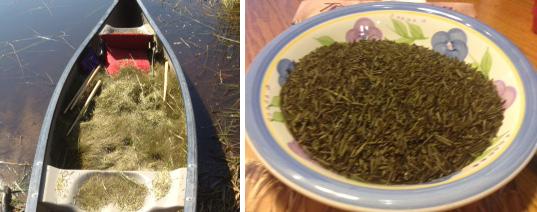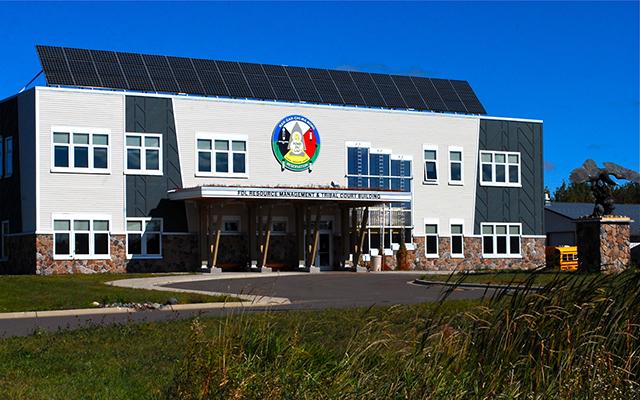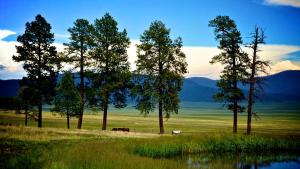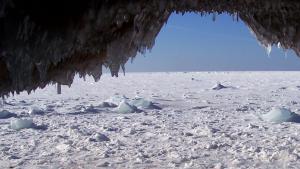Climate change poses a challenge to the Seven Generations philosophy
Members of the Fond du Lac Band of Lake Superior Chippewa believe that it is the obligation of the community to preserve and protect cultural resources for seven generations into the future. This Seven Generations philosophy is shared by many Tribal Nations, who implement the concept into decision making to ensure that future generations will benefit and not be negatively impacted. Adherence to this philosophy, though, is being challenged by climate change.
The reservation of the Fond du Lac Band covers 101,000 acres in northeastern Minnesota, including forested areas, undisturbed wetlands, and wild rice waters. The Band also retains fishing, hunting, and gathering rights in the Ceded Territories (areas ceded by the Band in treaties with the federal government), which encompasses eight million acres in northern Minnesota. Tribal community members are dependent on traditional food sources such as wild rice, fish, sugar bush, whitetail deer, and moose. Experts predict that the climate in Minnesota will become warmer through the century, with more precipitation extremes and changing ranges for traditional resources. Some of the subsistence species are already struggling to survive increased temperatures and heavier storm events.
Recent years have been challenging for the Fond du Lac Band. In 2012, rapidly changing temperatures led to the worst maple syrup yield in recent memory. A few months later, a 500-year flood wiped out the reservation’s entire crop of wild rice, a significant dietary staple. A drastic decline in the moose population resulted in the cancellation of the traditional moose hunt in 2013 and 2014, and possibly into the future. Fish spearing and netting seasons have become increasingly unreliable due to variability in ice-out dates (the date on when a lake is free of ice) and declines in fish populations.
A focus on combating the causes of climate change
Band members recognize what climate change can mean for traditional Ojibwe lifeways. In 2014, Fond du Lac Chairwoman Karen Diver was one of two tribal leaders appointed to President Obama’s Task Force on Climate Preparedness and Resilience, which developed recommendations to advise the administration on how the federal government can respond to the needs of communities that are dealing with the impacts of climate change.
Tribal leaders and staff have committed to reducing the Band’s contributions to the greenhouse gases that lead to warming through developing and promoting projects and policies that advance sustainability and energy efficiency. In 2007, the Fond du Lac Reservation Business Committee ratified the Kyoto Protocol, pledging to obtain 20 percent of its energy from renewable sources by the year 2020. A number of activities have been completed or are underway that are in support of that goal:
- The LEED-certified Fond du Lac Resource Management Building features a 12 kilowatt (kW) solar panel system that can provide up to 10 percent of the power required to operate the facility, reducing CO2 emissions by 13.72 metric tons annually.
- A smaller 3.25 kW solar photovoltaic system was installed on the Powwow Arbor at the Fond du Lac Ojibwe School. It is used for educational purposes and to provide power for sports events.
- Solar air heating units have been installed on rental homes to reduce the burden of high energy costs for Band members receiving energy assistance.
- Through a partnership with Minnesota Power, a local utility company, a one-milliwatt (mW) solar system that will provide approximately 10 percent of the power needs at the Black Bear Casino Resort is scheduled for completion by the end of 2016.
- The Band is developing a biomass district heating system that would use woody biomass from tree tops and limbs not currently utilized. Testing of raw materials has been completed, as well as preliminary engineering studies for two community centers currently heated with propane.
Fond du Lac Band Energy Efficiency and Emissions Reduction Projects
- Fond du Lac has participated in the State of Minnesota B3 Benchmarking Program since 2012. The purpose of the program is to provide tools for building management, and a means for monitoring and measuring any energy efficiency improvements made to the buildings included in the database.
- Fond du Lac is participating in a Guaranteed Energy Savings Program with a goal of a 25 percent reduction in energy costs. Investment grade audits on Reservation commercial buildings began in January 2015, and building upgrades are expected to be completed within two years.
- Several public housing facilities constructed on the Reservation since 2010 were built following the Minnesota Green Communities Guidelines. These include Supportive Housing, Veteran’s Supportive Housing, and an assisted living facility.
- A lighting retrofit project that replaced 2,500 light bulbs with more energy-efficient lighting technology in Reservation buildings has resulted in energy savings of two milliwatts and reduced carbon dioxide emissions by 1,268 metric tons annually.
- Eighth-grade students at the Fond du Lac Ojibwe School developed a "No Idling Policy" for school buses, which was adopted by both the School Board and the Reservation Business Committee in 2014.
- Twelve construction fleet vehicles and 11 school buses were retrofitted with diesel oxidation catalysts. This device breaks down pollutants from diesel engines in the enhaust stream, turning them into less harmful components, similar to a car's catalytic converter. Additionally, Scholastic Heaters were installed on five school buses to reduce the need for extended idling.
Building capacity to cope
A key component of the Fond du Lac Band’s approach is flexibility, which allows participation in opportunities as they arise. The Band has worked with local, county, state, tribal, and federal agencies, as well as higher education institutions, local utilities, non-profits, and private organizations, and will continue to foster existing partnerships and seek others as appropriate. The most significant challenges to moving forward are primarily financial—funding for projects and staff to conduct the work, as well as buy-in from management, which is trying to balance decreasing budgets with increasing expectations.
By participating in these partnerships, the Fond du Lac Band is continually increasing its capacity—strengthening the skills, competencies, and abilities of its people and its community—to cope with the impacts of a warming climate.






